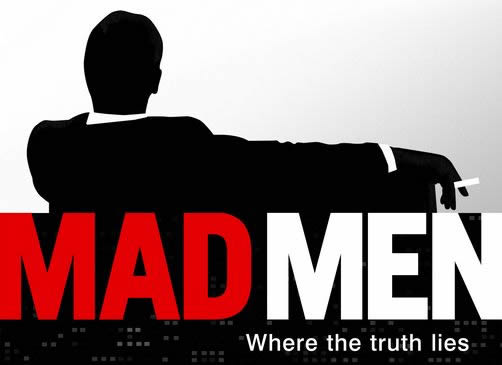 I share a Netflix account with my boys and Samuel has a sneaky way of moving his movies to the top of the que, so when I saw the email message "We have recieved..." I panicked and took the first recommendation I could find. The result was this AMC production called "Mad Men," which, as the show tells us on screen 1, is a term coined by Madison Avenue Advertising executives to describe themselves.
I share a Netflix account with my boys and Samuel has a sneaky way of moving his movies to the top of the que, so when I saw the email message "We have recieved..." I panicked and took the first recommendation I could find. The result was this AMC production called "Mad Men," which, as the show tells us on screen 1, is a term coined by Madison Avenue Advertising executives to describe themselves.
Although the production standards, and the writing, are quite simply beyond belief, I don't recommend this show for families. The world view is vile. The morality is beyond contempt. It doesn't appear to descend to the Sopranos brand of epidermis and blood, but it's no less evil in its own way.
The odd thing is that it makes an argument for God without appearing to know it--at least if the first three episodes are any guide.
Normally I absolutely cannot stand story lines which depend on a shared presumption about our collective take on cultural and political events. When "Mr. Holland's Opus" urged me to get weepy about John Lennon's death, I thought, "oh, please, why ruin a perfectly good story by hitching it to a pop icon?" Nabakov called this sort of thing "topical trash," and it's an easy trap. On one level, it's as simple as telling an old joke instead of a new one. Story-tellers have an urge to use known material, but however much we want to succeed as raconteurs, we can't do it by using old material. It always has to be, on some level, new.
Mad Men does have a topical angle--the response of the advertising world to the nation's realization that smoking tobacco could be dangerous to your health, but it makes the dilemma real by creating a credible character--(M)ad Man Don Draper--who has to figure out how to keep selling cigarettes to a world that knows better.
Don's real problem, however, is more sinister, and more revealing of the humanist's blind, arrogant, and ultimately childish rage.
Don senses there is something false about a 1960s American gentry that appears to worship suburban homes and suburban routines. The occasion of a neighborhood party has Don drinking beer all morning as he builds a playhouse for his daughter's birthday. The divorcee invited to the celebration is made to appear more "centered" than the married housewives gossiping about her inside the kitchen. Don, a shameless lothario, is made to appear more wise even though, and perhaps because, he doesn't believe in anything.
The reality here, of course, is that the very blessings God doles out, across generations, to those who believe in His word can be the very source of the soul-sickness thinking people sometimes feel when they sense the white picket fence isn't worth worshipping. The God who made the white picket fence is worth adoration, not the other way around. When suburban respectability becomes worshipped for its own sake, it becomes both a farce to the moral degenerates who ridicule it, and to the unthinking traditionalists who live it out of form's sake. I've always cringed when people make fun of the "Ozzy and Harriet mentality." I like Ozzy and Harriet. I wish there were more Ozzy and Harriets around today. The world would be more civil. I do think, however, that Ozzy and Harriet would have had greater dimension, and a more certain defense against the reviling of Hollywood low-lifes and tenured cynics, if we had come to understood the Nelsons' spiritual world-view. Ozzy spent a great deal of time giving basketball advice, and making fun of himself, but I can't recall him ever praying. The root of their family's basic decency was never explored. God was the silent, and un-credited, accomplice.
The Bible-illiterate, the latch-key child of Western Civilization is represented well in Mad Men's Don Draper. He doesn't like the rules, and so he breaks them, but when he sees his children, asleep in their beds at night, there is something about home, hearth, wife, and child that provides him peace in a way he can't understand, because he spends so much time ridiculing the world's rituals, he doesn't have any time to look up towards the heavens.

 We have been making steady progress on our pilot television/film festival version of life on the New Hampshire colonial frontier. We have a few final scenes to edit, a fair amount of color-balancing and sound work, and then a few transitions to engineer. I mean to make a systematic study of the "flash-back," since I haven't settled on any match of color and/or sound filtering that give it a fresh look. Even flashbacks inside a historical film still have to flash "back" somehow. We also need music, and we need some way of making up for something I didn't learn on the set. Movies need to give a character a chance to just look out across the valley and think. You need to show the militia captain polishing his musket and saying nothing. This movie has a lot of talkers. We need to show them working up to their speeches, so to, er, "speak."
We have been making steady progress on our pilot television/film festival version of life on the New Hampshire colonial frontier. We have a few final scenes to edit, a fair amount of color-balancing and sound work, and then a few transitions to engineer. I mean to make a systematic study of the "flash-back," since I haven't settled on any match of color and/or sound filtering that give it a fresh look. Even flashbacks inside a historical film still have to flash "back" somehow. We also need music, and we need some way of making up for something I didn't learn on the set. Movies need to give a character a chance to just look out across the valley and think. You need to show the militia captain polishing his musket and saying nothing. This movie has a lot of talkers. We need to show them working up to their speeches, so to, er, "speak."  I can say there is some genuinely good entertainment, and education, throughout, and I remain excited about where we might sell this. It has an adventurous, frolicsome, and yet dramatic and redeeming tone, which is more or less the target at which I was aiming.
I can say there is some genuinely good entertainment, and education, throughout, and I remain excited about where we might sell this. It has an adventurous, frolicsome, and yet dramatic and redeeming tone, which is more or less the target at which I was aiming. Without having a Hollywood budget, we acknowledged some of this, but we didn't dumb down the story either. We use period language, and we focus on period realities. We hope teenage boys and girls watch this, but it wasn't made for them either. Frankly, I worry that the story's straight-forwardness, and its more or less transparent moral contours will violate another assumption we have about watching film: cynicism and nihilism snuck into our movie-going experience along with the steady-cam and the three-cut-per-second edit. We have a generation idolizing a Johnny Depp femme-pirate, instead of the royal navy that is purposely made to fail in his capture. Audiences don't expect any clear virtue anymore. Even a film I enjoyed very much--The Patriot--began with a war hero's tortured memory of his combat experience. Try as I might, I have yet to read any 18th century warrior regret at anything other than cowardice. Valor was coveted, not shamed, and the urge to disbelieve-at-any-cost would be more symptomatic of a post-Sartre film-grunt than a South Carolina militia colonel.
Without having a Hollywood budget, we acknowledged some of this, but we didn't dumb down the story either. We use period language, and we focus on period realities. We hope teenage boys and girls watch this, but it wasn't made for them either. Frankly, I worry that the story's straight-forwardness, and its more or less transparent moral contours will violate another assumption we have about watching film: cynicism and nihilism snuck into our movie-going experience along with the steady-cam and the three-cut-per-second edit. We have a generation idolizing a Johnny Depp femme-pirate, instead of the royal navy that is purposely made to fail in his capture. Audiences don't expect any clear virtue anymore. Even a film I enjoyed very much--The Patriot--began with a war hero's tortured memory of his combat experience. Try as I might, I have yet to read any 18th century warrior regret at anything other than cowardice. Valor was coveted, not shamed, and the urge to disbelieve-at-any-cost would be more symptomatic of a post-Sartre film-grunt than a South Carolina militia colonel.
 Martin Luther King, in his letter from the Birmingham Jail wrote these lines, about the modern American church:
Martin Luther King, in his letter from the Birmingham Jail wrote these lines, about the modern American church:
